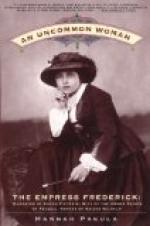She gave him such a sweet, enticing, and voluptuous smile that the cardinal trembled with desire and joy.
“When you in the capitol adorn Corilla with the laurel-crown, then will she willingly lay her myrtle crown at your feet,” said she, with a charming expression of maiden modesty.
The cardinal again pressed her passionately to his bosom.
“You shall have the laurel-crown, and your myrtle crown is mine!” he excitedly exclaimed. “You will soon see whether Francesco is a cold-hearted man! Farewell, Corilla!”
And with a hasty salute he left the room. The astonished Corilla dismissed him with a smile.
“If it is to succeed at all, it can be only through him,” said she. “Poor Francesco, he will bring me a full laurel-crown! And what can I give him in return? An exfoliated myrtle crown, that is all! No heart with it!”
THE HOLY CHAFFERERS
Cardinal Francesco Albani, meantime, hastened through the streets with the sprightliness of youth. He noticed neither the respectful salutations and knee-bendings of those he passed, nor their visible shuddering and alarm when under the cardinal’s hat they recognized the fierce and inhuman Francesco Albani.
He stopped before the palace of Cardinal Juan Angelo Braschi. The equipage of the new cardinal was drawn up before his door.
“Ah,” gleefully remarked Albani, “he is therefore yet at home, and I shall meet with him!”
Hastily entering the palace, and pushing past the servant who would have preceded him, he entered the cardinal’s cabinet unannounced.
“Be not troubled, your eminence,” said Albani, with a smile, “I will not detain you long. I know your habits, and know that Signora Malveda usually expects you at this hour, because Cardinal Rezzonico is not then with her! But I have something important to say to you. You know I am a man who, without forms and circumlocutions, always comes directly to the point. I do so now. You desire to be the successor of Ganganelli?”
Braschi turned pale, and timidly cast down his eyes.
“Why are you shocked?” cried Albani. “Every cardinal hopes and wishes to become the father of Christendom—that is natural; I should also wish it for myself, but I know that that cannot be. I have permitted these lord cardinals who, in the conclave, invoke the Holy Spirit, to look too much into my cards. I was not so prudent as you, Braschi, and therefore you are much the more likely to become God’s vicegerent! Would you not like to be pope, if Ganganelli should happen to die? And how high would you hold my voice—how much would it be worth to you?”
“More than all I possess, infinitely more!” said the shrewd Braschi. “Were I sure of your voice, I might then have a definite hope of becoming pope; for your voice carries many others with it. How, then, can you expect me to estimate what is inestimable?”




